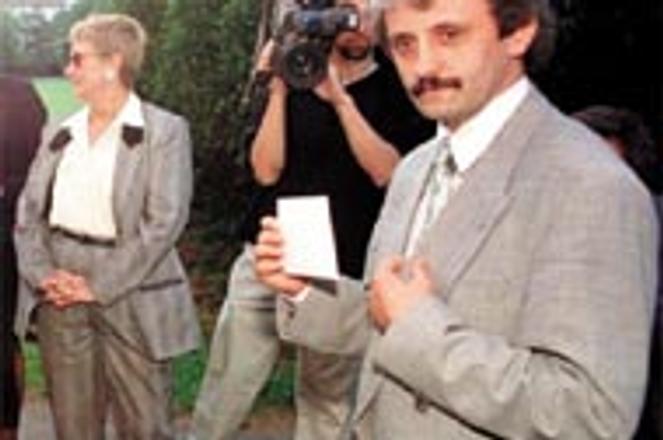The damage done. Mikulaš Dzurinda, the leader of Slovakia's strongest opposition party, the SDK, is confronted by journalists wanting information about a bribery scandal that has engulfed the party and threatened to alienate its supporters.TASR
Four months before national elections, the strongest opposition party, the Slovak Democratic Coalition (SDK), has been accused of trying to bribe nineteen independent journalists to provide positive coverage of SDK activities.
Jozef Paczelt, head of the SDK's campaign staff, resigned on June 5, more than a week after the scandal became public. "Under normal circumstances I would have quit the day after this scandal broke," said Paczelt in an interview for the Slovak daily SME. When asked why he hadn't quit, Paczelt replied "because the SDK [leadership] confirmed me in the position," but added that he felt responsible for the crisis. "The connection between what happened and political responsibility for it is clear," he said.
But SDK leader Mikuláš Dzurinda said that political responsibility lay with the SDK leadership. Publicly supporting Paczelt one day after the scandal hit the front pages of Slovak dailies, Dzurinda declared that "not a single hand was raised for Paczelt's removal."
The bribery affair was exposed on May 28, when the independent weekly Domino Fórum broke the news. "According to our information, three journalists have independently confirmed that they were offered a high sum of money by people close to SDK in exchange for their cooperation," wrote Štefan Hríb, the author of the piece. "Naturally, in their articles they [journalists] were supposed to 'consider' the specific needs of the SDK."
At the center of the scandal was Adriana Hosťovecká, a former journalist who runs the agency that was looking after the SDK's PR needs. Hosťovecká, who has a child by Paczelt, was accused of having offered journalists the money through her agency. Allegedly, sums of up to 10,000 Sk per month were proposed in return for sympathetic reporting.
Daša Matejčíková, a reporter for the daily SME, said that "I was offered the job [of sympathetic reporting] by Adriana Hosťovecká only once, and it was sometime in February." Matejčíková explained that she had come forward with the information "only after more journalists rejected this offer," because she "didn't want to harm either side."
But Hosťovecká denied that she had meant to bribe the reporters. "I wanted to create a kind of media commission for meeting with journalists," she said. "The commission would discuss and offer solutions to any problems appearing on the political scene," she added, explaining that the journalists were to have remained anonymous with only herself acting as a conduit between the nameless scribes and SDK politicians.
"I told the journalists very clearly that it was only for my purposes and not even the politicians would know their names," Hosťovecká continued. "I didn't want them [journalists] to be blackmailed by politicians."
Despite Hosťovecká's insistence that her actions were just a part of the "usual job of [a PR] agency," the SDK terminated its contract with her agency on May 29.
Playing with names
Various speculations have surfaced over how many journalists were actually involved. Hosťovecká said she approached 19, three of whom confirmed Hríb's allegations after Dzurinda tried to sweep the whole affair under the carpet.
Hosťovecká told the SME daily that all journalists approached had rejected the offer of money, but added that "sixteen of them functioned according to our deal, while three rejected the cooperation altogether."
However, on June 3, the TASR state news agency published a list of 11 journalists, working mostly for independent media (Radio Twist, TV Markíza, the weekly Plus 7 dní and the daily Práca), and who were supposed to have accepted money from Hosťovecká. Six journalists whose names appeared from the published list denied any cooperation, while one initiated legal proceedings against TASR.
TASR Director Dušan Kleiman said he couldn't reveal the name of his source for the list, but promised the information was reliable. "All world agencies do it. If the source doesn't want to be published, we have to respect it," he said.
For her part, Hosťovecká claimed that the list was a "forgery," and added that she didn't recognize at least two names that appeared on the TASR document. "We have never published such a list," confirmed Paczelt.
Ducking responsibility
The SDK has been strongly criticized for seeking to avoid responsibility for the scandal. Matejčíková reported that she had first told Dzurinda about the bribery offer five weeks before the scandal erupted. "His reaction was very neutral, and he looked surprised," she said. Confronted with the information, Dzurinda denied having been told.
Pavol Rusko, Director of TV Markíza, said that he believed that Dzurinda had committed a serious mistake by trying to defend Paczelt.
"It was stupid and crazy to tell journalists and Slovak people that 'I believe Paczelt doesn't know about the activities of Adriana Hosťovecká'," Rusko said. "Miki said this, and all journalists said, 'Ha ha, you are lying, either lying or stupid. And I believe Paczelt.'"
Milan Kňažko, an SDK deputy, refused to say who might take political responsibility for the scandal. "For the SDK, this case was closed when we terminated the contract with the agency of Adriana Hosťovecká and later with Mr. Paczelt's agency as well," he said. "We don't intend to comment on the issue further."


